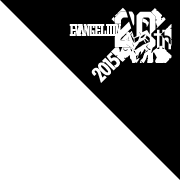Anime Business Hit the Bull’s-Eye in EC
Tezuka’s first turning point came at his new place of assignment, Parco City. The opportunity came in the form of a certain man who was responsible for developing the EC site’s system.
“He was a person well-versed in otaku culture. I heard rumors that in his previous company, he made anime goods which became a big hit through their webshop. At the time, our EC Division was making poor sales, and it was during such a time that he took me with him to Comic Market during midsummer. Since I wasn’t particularly interested in anime, I still remember my shock when I realized such a world existed. This encounter was what hinted at the seeds that we should try linking fashion, Parco’s specialty, with anime in business. Our first product was a strap for the 2009 anime movie Summer Wars. We sold those at the Summer Wars Shop opened for a limited duration in Kichijoji Parco, and it was a great success. Our next try was the M-65 military jacket worn by the protagonist of the Eden of the East TV series. This was a serious product costing about ¥30,000 which I entrusted to an acquaintance of mine who is also a designer for the Tokyo Collection. Although it was merely experimental, we made another seasonal shop for it at Kichijoji and tried selling it online at the same time, and in the blink of an eye, thousands were sold.”
After being assigned to an unlikely position, Tezuka reached out to anime content businesses due to an unexpected opportunity. Afterwards, their EC site made hits with various products combining anime with fashion. Following the success of their seasonal shops held at Kichijoji Parco, a real shop named Monozoku opened its gates to customers in Shibuya Parco Part 3 in 2010.
“Now that I think about it, the reason it worked out so well was because it wasn’t a real shop but the rather free EC Division. At the time, I was about the only one in the company who was trying to do business with anime. Since originally it’s a fashion company, I think they might have been a little averse, to be honest. However, after Evangelion: 2.0 You Can (Not) Advance came out in 2009, the winds changed. Until a little before 2.0, even Comiket had the same hardcore otaku atmosphere, but after 2.0, company booths gradually became more pronounced. Even to someone like me who didn’t know anime culture so well, there was a visible change in the atmosphere of the visitors.”
It was around 2010 that Monozoku opened shop—the transition period when Japanese anime culture started permeating the everyday lives of ordinary people. It was also around the same time that another turning point came in Tezuka’s career: His encounter with Yoshio Muto, the previous director of Radio Eva, the official project of Rebuild of Evangelion that creates items, mostly apparel, in a refined taste that blends into everyday style.
“The first I saw was a collaboration item with Yoshida Kaban that was being sold in Minotaur, a limited-time-only shop at Shibuya Parco. Due to my position, I was always looking for projects for Monozoku and continuously searching for common ground between anime and fashion, and Radio Eva products came as a shock to me. It was because instead of just putting a character’s face on their goods directly, they expressed Eva by using it as an element weaved into the design of the product. I looked at the tag and it said “Radio Eva,” so I looked it up on the internet right away and emailed them from the official site. I simply wanted to know what kind of person the maker was, to meet him in person.”

The Porter × Mug × Radio Eva triple collaboration bag made in 2007. It was when he saw this bag using Unit-01’s colors as a design element that Tezuka encountered Evangelion.

